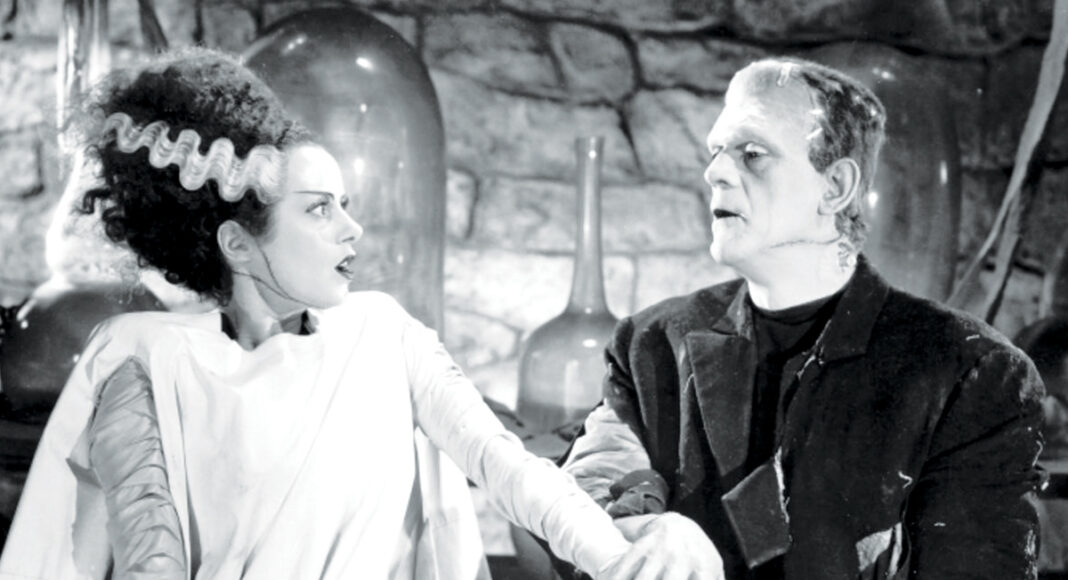Most 200-year-old literature has long faded into obscurity or irrelevance. (Anyone reading much Washington Irving these days?) But Mary Shelley’s Frankenstein, first published in 1818, has never really gone away.
Whether on page, stage or screen, Frankenstein has proven to be the eternal story, largely because of its brilliant alchemy to be both timeless and timely. It offers themes of universal human experience that art has been wrestling with since antiquity, and of how to grapple with the ethical dimensions of science and technology that refresh the story for every generation.
A handful of writers, artists, scientists, and Frankenstein true believers will be gathering on the campus of UCSC this month for a remarkable celebration of a remarkable story. FrankenCon is a three-day conference on the rich legacy of Frankenstein, which kicks off with a double-feature of the classic James Whale films from the 1930s, Frankenstein and Bride of Frankenstein, at DNA’s Comedy Lounge on Nov. 21. That will be followed by two days of on-stage discussions on campus with a number of people in fields as diverse as the arts, media, astrophysics, genomics, and academia.
FrankenCon also coincides with a two-weekend run of Kirsten Brandt’s original adaptation The Frankenstein Project at Theater Arts Mainstage at UCSC, playing for seven performances Nov. 15-24. The play is a reinvigoration of Shelley’s tale recast with female leads as Dr. Frankenstein and the Creature.
UCSC theatre-arts professor Michael Chemers, well-known on campus for his popular course titled “Monsters,” is the moderator and one of the chief organizers of the event. “What we’re really trying to do with this conference is investigate how the myth of Frankenstein, the legend of Frankenstein, the story of Frankenstein, is imbricated deeply into many different aspects of our culture,” he says, “and how we think about big ideas like, ‘What is the role of ethics in science? What is the responsibility of the creator to the created? What is the responsibility of the strong to the weak?’ It’s about parenthood. It’s about the relationships of gods to the things they create, and the responsibility of leaders to their followers.”
After the showing of the Whale films at the Comedy Lounge, Chemers will lead a post-screening discussion of the films with GT editor Steve Palopoli, UCSC literature professor Renee Fox and Digital Arts and New Media lecturer Tad Leckman.
The next day, Chemers will have separate one-on-one discussions with YA novelist Kiersten White (The Dark Descent of Elizabeth Frankenstein) and playwright and screenwriter Jennifer Haley (Mindhunter). Nov. 22 and 23 will also feature more roundtable discussions: One on the artistic legacy of Frankenstein with UCSC faculty, including Fox, game designer Micha Cardenas, literature prof Marshall Leicester, and historian Nathaniel Deutsch. The second discussion focuses on science and ethics with Genomics Institute professor David Haussler, sociologist Jenny Reardon, and astrophysicist (and former UCSC chancellor) George Blumenthal.
Chemers says that Frankenstein merits particular attention because of its broad influences in everything from folk myth to science fiction. For instance, the portrayal of robots in the popular imagination owes a thematic debt to Frankenstein. “All the dramas about A.I. beings running amok, the dinosaurs in Jurassic Park, Bladerunner,” he says. “These are all Frankenstein stories.”
Kirsten Brandt, long-time faculty member in UCSC’s theatre-arts department who recently joined San Jose State’s faculty, has been interested in the Frankenstein story since she was a teen (“It was during my goth period,” she says). In 1998, while working at San Diego’s avant-garde theater company Sledgehammer, Brandt wrote The Frankenstein Project, which was produced at Sledgehammer and then twice more, most recently in 2005.
The play, says Brandt, has some nods to the horror-movie Frankenstein of popular imagination, but mostly, it’s drawn from the Shelley novel. Making the main characters female has added new dimensions to the relationship between the creator and the creation. The feminist themes run deep, not only because the novel touches on the life-giving power of women, but because it was one of the rare classics in 19th-century literature written by a woman, who herself was the daughter of Mary Wollstonecraft, one of the most important proto-figures in contemporary feminist thought.
“Shelley was able to zone in on something inherent in who we are as humans,” says Brandt, “in terms of our ability to seek out knowledge. She says at one point [in the play], ‘Study has become more necessary to me than the air I breathe.’ That’s actually straight from the novel.”
The play delves deep into science, from period obsessions like alchemy and anatomy to modern-day technologies like stem-cell research, biotechnology and transplant surgery. Brandt says the play is 90 minutes packed with Black Mirror-style themes of technology’s ethical gray areas.
“It’s scary, it’s freaky, it’s beautiful,” she says. “I don’t want it to haunt anybody, necessarily, but I do want (audiences) to process it. It’s not, ‘I get to see a monster movie.’ It’s more asking you to think about right now, about what we create. As parents, or creators, what’s our responsibility?”
FRANKENCON
The Frankenstein Project, written and directed by Kirsten Brandt will be performed Nov. 15-17 and 21-24. Thursday, Friday and Saturday at 7:30pm and Sunday at 3pm at Mainstage Theater Arts, UCSC. ucsctickets.com.
James Whale’s Frankenstein and Bride of Frankenstein will be screened Thursday, Nov. 21 at DNA’s Comedy Lab, 155 S. River St. Santa Cruz. 7pm. $10.
Conference roundtable discussions take place Friday and Saturday, Nov. 22 and 23, at Digital Arts Research Center and Second Stage Theater Arts, UCSC. Free.
For full schedule, go to frankencon.com.














Will Al Franken make an appearance?
We were unable to secure Mr. Franken’s participation, nor R. L. Stine’s.